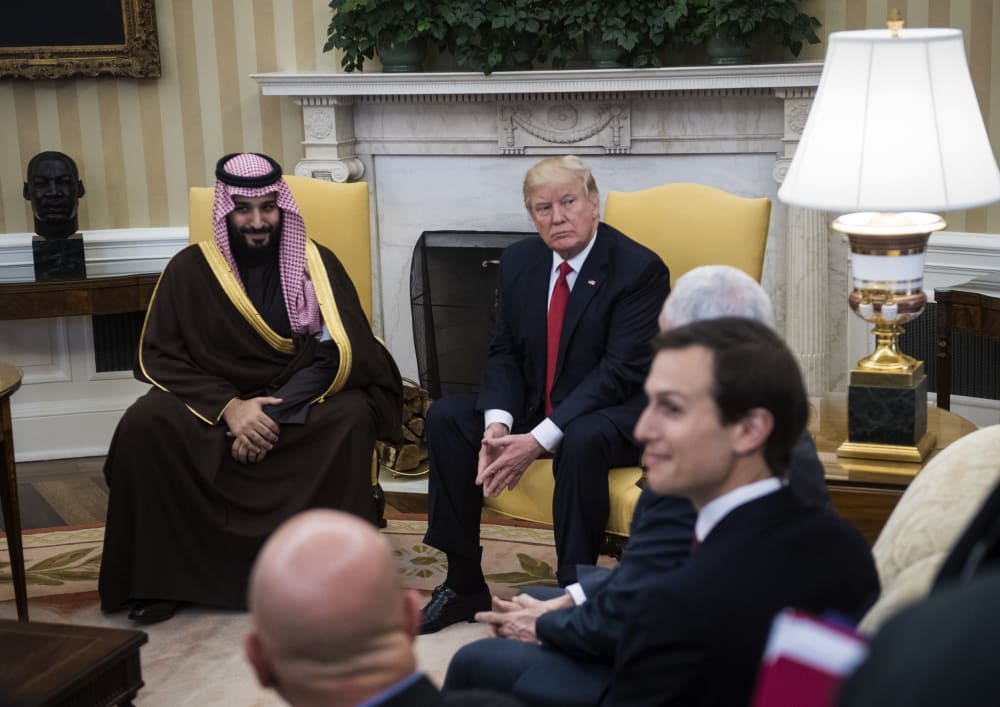Another day, another story of breathtaking corruption in Trump World. This time it’s new details about how former President Donald Trump and his son-in-law Jared Kushner enriched themselves with the help of the Saudis. The story deals yet another blow to the U.S.’s global reputation by exposing the vulnerability of our government to shady quid pro quos.
Last year The New York Times described how a Saudi sovereign wealth fund led by Saudi Crown Prince Mohammed bin Salman (often referred to as MBS) invested billions of dollars in Kushner’s fledgling private equity firm six months after the end of the Trump presidency, even though the fund’s advisers assessed that investing in Kushner’s company would be a financial and reputational risk for MBS. The imprudence of the investment was a red flag — ethics experts raised questions about whether it suggested the Saudi crown prince was looking to advance or make good on a political deal.
Kushner was a senior White House official, and details about who invested in a company he launched the day after he left the White House are a matter of public interest.
A new Washington Post report adds more details: Kushner created the company that turned into a private equity fund the day after he left the White House and “structured those funds in such a way that it did not have to disclose the source.” And filings from the Securities and Exchange Commission show that Kushner has declined to describe how almost all of his fund’s assets are from a sovereign wealth fund. The Post reports that Kushner’s company “stands to receive a $25 million management fee annually from the Saudi investment plus a share of the profits.”
In other words, Kushner has sought to block the public from knowing about the source of investment in his company. It’s legal, but it isn’t appropriate. Kushner was a senior White House official, and details about who invested in a company he launched the day after he left the White House are a matter of public interest. Kushner treated Saudi Arabia especially well when he was at the White House. Among other things, he worked to shield MBS from diplomatic consequences after the murder of Saudi dissident Jamal Khashoggi, which the U.S. intelligence community believes MBS ordered. Kushner also developed a close personal relationship with MBS — they reportedly chatted late into the night several times during a personal visit.
Kushner’s decision to not disclose the source of money for his private equity firm suggests that he may have known the financial relationship represented, at the very least, a conflict of interest. In a worst-case scenario, his choosing not to disclose the source of the funds could be an attempt to cover up clues to deal-making that involved exchanging political favors for money.

Shortly after Trump left office, the Saudi sovereign wealth fund-backed LIV Golf series began holding tournaments on his golf courses. The Post report notes that Saudi Arabia invested in Trump at a time when he was in financial need, in part because of the pandemic’s effect on his businesses and in part because his brand had become divisive. Trump also made a deal with a Saudi real estate company that plans to build a Trump hotel in Oman. Making things even weirder is that the deal makes Trump, a former president of the United States, a partner with the government of Oman. That raises yet another set of questions about the propriety of his entering into a partnership with another government.
Kushner and Trump declined to comment to the Washington Post for the story. (Trump’s spokesman said that Trump has “used his superior negotiating skills to ensure this country is never beholden to anyone.”)












